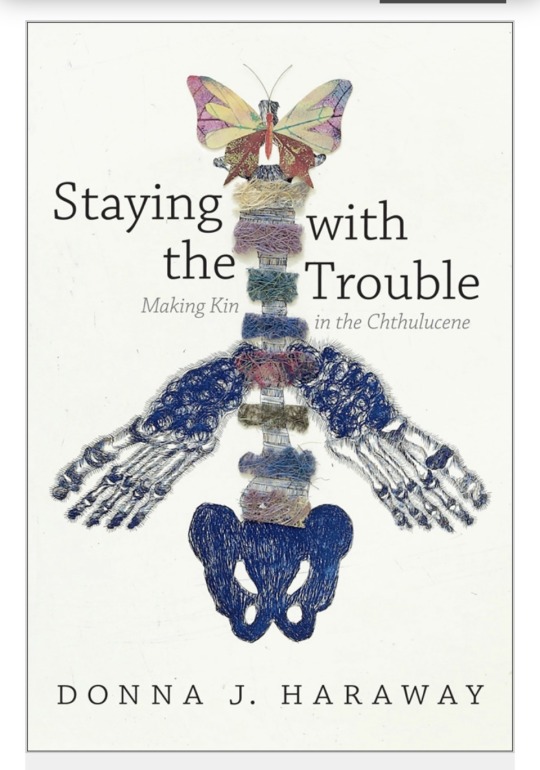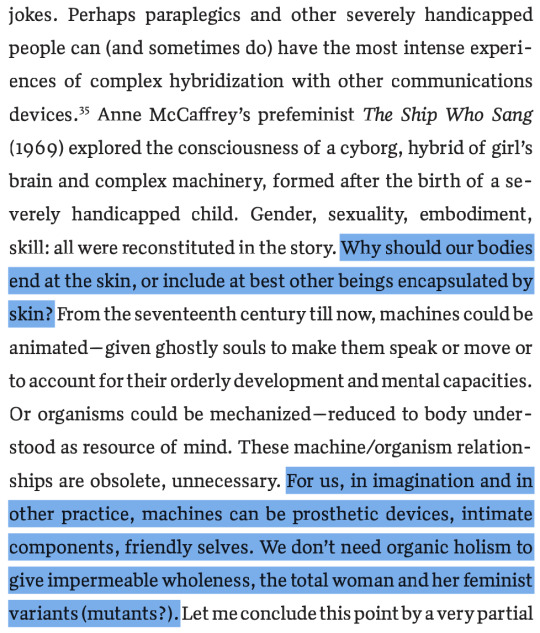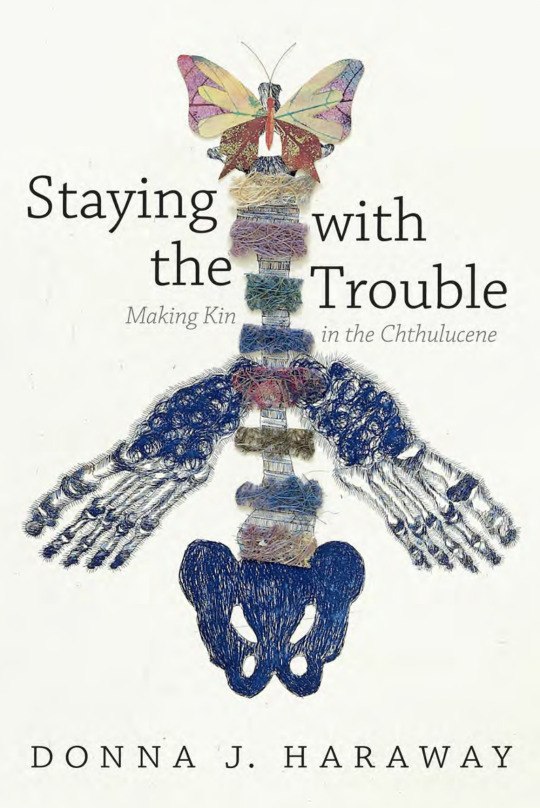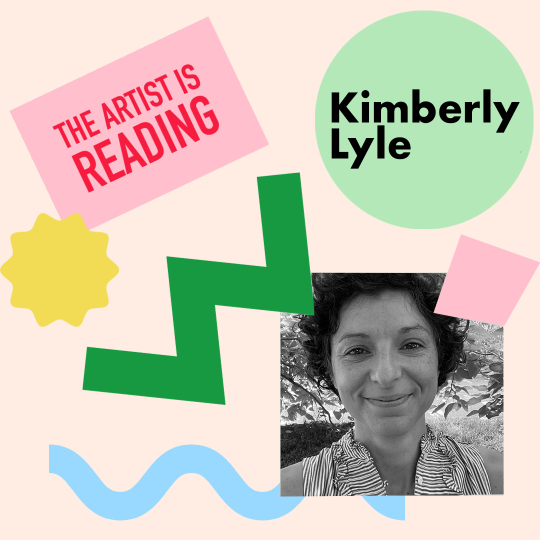#Donna J Haraway
Text
The main trouble with cyborgs, of course, is that they are the illegitimate offspring of militarism and patriarchal capitalism, not to mention state socialism. But illegitimate offspring are often exceedingly unfaithful to their origins. Their fathers, after all, are inessential.
A Manifesto for Cyborgs: Science, Technology, and Socialist Feminism in the 1980s, Donna J Haraway
201 notes
·
View notes
Text
Donna Haraway is the most powerful autist on the planet
3 notes
·
View notes
Text

In the midst of spiraling ecological devastation, multispecies feminist theorist Donna J. Haraway offers provocative new ways to reconfigure our relations to the earth and all its inhabitants. She eschews referring to our current epoch as the Anthropocene, preferring to conceptualize it as what she calls the Chthulucene, as it more aptly and fully describes our epoch as one in which the human and nonhuman are inextricably linked in tentacular practices. The Chthulucene, Haraway explains, requires sym-poiesis, or making-with, rather than auto-poiesis, or self-making. Learning to stay with the trouble of living and dying together on a damaged earth will prove more conducive to the kind of thinking that would provide the means to building more livable futures. Theoretically and methodologically driven by the signifier SF—string figures, science fact, science fiction, speculative feminism, speculative fabulation, so far—Staying with the Trouble further cements Haraway's reputation as one of the most daring and original thinkers of our time.
#donna haraway#Donna j haraway#anthropocene#ecology#art and ecology#contemporary art#fine art#staying with the trouble#tentacular thinking
1 note
·
View note
Text
does anyone else feel like spending time online separates you from the context of the world around you? does anyone else feel like your identity slips away without the foundation of your upbringing? does anyone else feel like having an online identity necessitates compressing the culture you came from, destroying it, and losing touch with the familial and historical roots that ground you to your truest self?
3 notes
·
View notes
Text
max's september 2023 reads
i have always been faintly jealous of the people who post little lists of the articles/books they read at the end of the month. lo and behold, i have realized this is in my power to remedy. i've also assembled a list of my favorite short stories and articles of all time :)
fiction
Vergil's Aeneid, book 12 (aeneid daily reread) (review)
the latter half of Pride and Prejudice by Jane Austen (review)
Edmund Spenser's Faerie Queene, books 1-3
selections from Edmund Spenser's Shepherd's Calendar (review)
Shakespeare's Macbeth (for the fourth time now)
the latter half of Us Against You by Frederick Backman (review)
Gregor the Overlander by Suzanne Collins (review)
I Am Your Spaniel by Gislina Patterson (i have a[n author-sponsored] pdf of this if anyone should like it!)
Peerless by Jihae Park (review)
Twelfth Grade Night by Molly Horton Booth (review)
the first two episodes of What Happens Next comic
nonfiction
The Secret to Superhuman Strength by Alison Bechdel (review)
Why Centrism Is Morally Indefensible by Nathan J. Robinson
(↳ musings on Tim Urban's book about polarization)
The Promise of Monsters: A Regenerative Politics for Inappropriate/d Others by Donna Haraway
(↳ this was classwork and i understood maybe half. but the half was good!)
What Do We Owe Afghanistan? by Nathan J. Robinson and Noam Chomsky
(↳ on the war in Afghanistan and the evils of the US military; cws for everything you'd expect)
What is a Woman? (A Response) by Julia Serano
(↳ on the TERF's favorite question)
video essays
PragerU and the Politics of Pain by Zoe Bee
(↳ do leftists centrally aim to avoid pain? and is that a bad thing?)
On the Ethics of Boinking Animal People by Patricia Taxxon
(↳ ostensibly what the title says, but actually a detailed musing on the essential properties of furry media and the freedom of dehumanization; changed my life a bit)
#this looks like so much but it was a lot of graphic novels + plays. and schoolwork. dear god.#either way it sure does give you a picture of how i spend my free time doesn't it.#should i do albums too. i enjoy albums. lately it's been new hozier + new mitski + new olivia rodrigo#anyway rook in the event that you're reading this there is a missing persons cw on what happens next#max.txt#readings
29 notes
·
View notes
Note
hello i have a genuine curious question!! ik you talk a lot about the gender binary & i wonder what are your thoughts on butler if you've ever read her? on another subject i'm also curious what your fav text might be if you're willing to share xx
hello! u have clocked me i do in fact love 2 talk abt gender etc so! happy 2 answer <3
i have read butler, though not extensively--i first read performative acts and gender constitution while i was an undergrad and that's really the only work of butler's that i would consider myself familiar with, though i've also read some different excerpts from gender trouble and bodies that matter in other college courses.
generally speaking, based on what i have read of butler's work, i'd say i consider myself a fan <3 butler's theory of gender performativity has been so influential and definitely altered my own way of thinking about gender. unfortunately i think butler's idea that gender is performatively constituted oftentimes gets misinterpreted/simplified down into gender = performance both by people who are trying to agree and by people who are trying to disagree which. is a little funny but also a little frustrating
as far as a favorite text!! i don't think i can choose just one lol. i've read a lot of texts about gender that have said a lot of different things and challenged me 2 think in a lot of different ways, all of which i've liked for different reasons. i will say that probably the three most influential texts i encountered in my time as an undergrad in terms of how they like...sparked a personal shift in my own worldview or thinking were probably:
butler's performative acts and gender constitution
lee edelman's no future: queer theory and the death drive (specifically ch 1, 'the future is kid stuff') (also here's a post where i talk thru my edelman crash course if u want the sparknotes lol)
andrea long chu's on liking women
however there are many more texts that i would recommend!! here's a post where i talk about a bunch, but i will quickly list some more recs:
the invention of heterosexuality, by jonathan ned katz
whipping girl, by julia serano
this bridge called my back, ed. by cherrie moraga + gloria anzaldua
sister outsider, by audre lorde
women, race & class, by angela y. davis
a cyborg manifesto, by donna j. haraway
females, by andrea long chu
39 notes
·
View notes
Text


Donna J Haraway, A Cyborg Manifesto
10 notes
·
View notes
Text
All of the episode titles in Season 1 are the names of chapters in Charles Darwin's "On the Origin of Species" (1859) (although not in the same order as in the book).
Season 2 episode titles are taken from "Novum Organum," which describes a new system of logic, by British author, statesman and philosopher, Francis Bacon (1561-1626).
The episode titles for Season 3 come from the Farewell Address of former United States President Dwight D. Eisenhower in which he discusses the rise of a military-industrial complex.
According to the BBC, episode titles for Season 4 are taken from or inspired by the writings of Donna J. Haraway, Distinguished Professor Emerita at the University of California, Santa Cruz - specifically, "Simians, Cyborgs, and Women: The Reinvention of Nature" and "A Cyborg Manifesto: Science, Technology, and Socialist-Feminism in the Late Twentieth Century". The show's writers were influenced by her writings in gaining an understanding of how the ethical considerations of human cloning might affect the main character(s)' psyche(s).
The titles for episodes of Season 5 come from the poem 'Protest' by American poet and author Ella Wheeler Wilcox.
7 notes
·
View notes
Text

Chapter 13. Biophilia, Creative Involution, and the Ecological Future of Queer Desire by Dianne Chisholm
Our essence as a species binds us to explore and affiliate with all life. We are lovers who can add up glucose, amino acids, water, fragrant oils, pigments, and other issue and call it both a flower and a mystical gesture. We can also decimate pollinators with an unloving tonnage of pesticides, precipitating the extinction of entire populations of those mystical gestures, once and forever. Lives without access to sensations are lives that edge out the earth’s raw, pervasive sweetness, that deeply biophilic connection to all life. –Ellen Meloy
Biophilia can be a mindful reverence for the infinity of organic sexual-social order; a love for the diversity of non-human life that stirs the mind to infinity for the beneficial enlightenment of humanity
Biophilia can be an earthy curiosity for the erotic vitality with which life affects fidelity to extreme geography; an erotic-ethical affiliation between humans and nonhuman life in experimental symbioses whose ecological benefits are sensed and desired, if not fully cognizable (360)
Biophilia, Episemophilia, Cognitive Adventuring
What do nature writers want?; nature writers desire to know what nature desires (361)
“What does a prickly pear cactus desire that couples it so tenaciously to bare basalt sandstone with a sexual rhythm that erratically keeps pace with drought and flash flood? What conjunction of organic and inorganic elements add up to such a thriving, if exotic, symbiotic assemblage?
the ‘intercourse’ that can develop is not zoophilic bestiality nor anthropomorphic romancing; rather it is a transmutation of human being into something other, prompted by the closeness of the human body to the vibrating heat and rhythms of the animal pack (361)

‘Becoming-other-than-human’; by being so close to animals (in this case big horn sheep) Ellen Meloy becomes caught up in the pack's migrations and affections in an other dimension of belonging to place. She senses an otherworld with de-familiarized, or deterritorialized human sensibility—a sensibility pushed to the limit of being human on the threshold of becoming other and she wishes to “bring back their startling news” to the human side, where human knowledge of the nonhuman can be put to mutually beneficial work.
The human mind evolve(s/d) in contact with animal life (Meloy). Children playacting the animal; children are drawn to animals, animating the senses, connecting and communicating with others, to explore and affiliate with nonhuman lifeforms.
“Touched by indigenous life to the desert heartland, Meloy allies herself with native nature/culture and she foregrounds and reconnects pre- and post-colonial territorial practices” (372)
“To Touch an Otherworld”:Biophilic Ethics
Species interdependence is the name of the worlding game on earth, and that game must be one of response and respect…Queer messmates in mortal play, indeed.—Donna J. Haraway
For humans to aid bighorn survival, it is crucial to understand the zoogenic factor (or the autopoiesis of animal life) in co-evolutionary ecology.

Synthesis weds symbiosis in a post-anthropocentric recovery of the wild—a becoming-animal of wildlife management that “runs contrary to the historical imperative to press everything alive, dead, or otherwise into human service” (307) (374)
Deleuze emphasizes the anti-utilitarian, communal ethics of becoming-animal. “it is no longer a matter of utilizations or captures, but of sociabilites and communities” (1988, 126) (375)
Human alliances with wild animals that do not only protect animal territoriality but also promote animal-earth symbiosis. How can human interference proceed while respecting and/or preserving the other’s own relations and world? (375)
The Ecological Future of Queer Desire
“Opponents to native fish recovery programs…measure worth as most of us do, by human ego. What good are these fish? You can’t eat them, they appear to have no medical, economic, sport, or industrial value…even their file drawer in the wildlife management bureaucracy ---“nongame”---assigns them not their own innate something but that which they are not: not sport, not food. These fish, many people believe, are dead-end. Tertiary detritus with strange humps, and weird lips. They are just too queer….what does a humpback chub want?” ---Ellen Meloy

Rejects the ‘survival of the fittest’ in favor of cyborg syntheses and unnatural symbiosis (survival of the queerest?)—sexual selection that refines and perfects the family tree
‘sexuality is badly explained by the binary organization of the sexes, and just as badly by a bisexual organization within each sex. Sexuality brings into play too great a diversity of conjugated becomings; they are like n sexes, an entire war machine through which love passes” (Deleuze and Guttari 1987, 278) (375-6)
“Only queers can battle an imperative that unites Left and Right, thereby neutralizing domestic politics” (Lee Edelman, 2004)
“A better science and monitoring is required if variants are to be identified as sympatric (species that cohabit the same region, which do not usually interbreed but which do hybridize naturally, if rarely) or extrinsic (hybridization due to human civilization). More than improved technology , it takes devotion to distinguish variations that signal either adaptive evolution or “the last-ditch, high-pitched shriek of preextinction”. For life’s sake—or more precisely, for life for life’s sake—our biophilia is put to the ultimate test. (379)
#queer ecologies: sex nature politics desire#queer ecology#critical ecology#queer theory#ecofeminism#environmental politics#ecology#biophilia#nature#love of nature#endangered species#animals#species#extinction#colonialism
3 notes
·
View notes
Text
End of year reading round-up! Woo-hoo!
My reading goal for 2023 was to read a book a week – while using very broad definitions of “book” (includes things like plays, novellas, and graphic novels), “read” (audiobooks and radio recordings count, not just written texts), and “week” (sometimes I read multiple short things in a week, sometimes it took me two or three weeks to get through a longer book). I’m also defining “finished” as when I’m done with the book, but not necessarily when I’ve read every word on every page – I picked and chose chapters a bit from the essay collections, for example, and bounced off a few books halfway through if they just weren't for me or weren't for me at that time. Anything with an asterisk is a reread. I have these roughly in chronological order of when I finished them, but I tended to be in the middle of several books at once and didn’t keep a good spreadsheet to keep track, so it’s a bit cobbled together from my memory and library records. Also, please note that just because I read a book, doesn’t mean I agree with or endorse all or even most of the ideas in it.
The Ministry of the Future by Kim Stanley Robinson
Parable of the Sower by Octavia Butler
New York 2140 by Kim Stanley Robinson
The Lifecycle of Software Objects by Ted Chiang
Flight Behavior* by Barbara Kingsolver
The Water Knife by Paolo Bacigalupi
The Girl Who Circumnavigated Fairyland in a Ship of Her Own Making* by Catherine M Valente
Deerskin* by Robin McKinley
Holy Silence by J Brent Bill
You Don’t Have to be Wrong for Me to be Right by Brad Hirschfield
A Letter in the Scroll by Jonathan Sacks
Parable of the Talents by Octavia Butler
One Nation, Indivisible by Celene Ibrahim and Jennifer Howe Peace
Chalice* by Robin McKinley
Braiding Sweetgrass* by Robin Kimmerer
Dracula* by Bram Stoker
Hamlet* by Shakespeare
Love in the Time of Cholera by Gabriel Garcia Marquez
Here All Along by Sarah Hurwitz
This is Real and You Are Completely Unprepared by Alan Lew
The Scientist’s Guide to Writing by Stephen B Heard
Everything is God by Jay Michaelson
The Cooking Gene by Michael W. Twitty
Demon Copperhead by Barbara Kingsolver
The Poisonwood Bible* by Barbara Kingsolver
The Power of Ritual by Casper ter Kuile
Unsheltered* by Barbara Kingsolver
Pride and Prejudice* by Jane Austen
Cadillac Desert by Marc Reisner
No Cure for Being Human by Kate Bowler
Everything Happens for a Reason and Other Lies I’ve Loved by Kate Bowler
Jane Eyre* by Charlotte Bronte
Praying with Jane Eyre by Vanessa Zoltan
Wide Sargasso Sea by Jean Rhys
Barrel Fever by David Sedaris
When You Are Engulfed in Flames by David Sedaris
Proverbs of Ashes by Rita Nakashima Brooks and Rebecca Ann Parker
The Splinter in the Sky by Kemi Ashing-Giwa
Staying with the Trouble* by Donna Haraway
Project Hail Mary by Andy Weir
The Incarnations by Susan Baker
Saving Paradise: How Christianity Traded Love of This World for Crucifixion and Empire by Rebecca Ann Parker and Rita Nakashima Brock
The Anthropocene Reviewed* by John Green
The Hundred Years’ War on Palestine by Rashid Khalidi
My Promised Land by Ari Shavit
This is How You Lose the Time War by Amal El-Mohtar and Max Gladstone
Enemies and Neighbours: Arabs and Jews in Palestine and Israel by Ian Black
Dragonflight* by Anne McCaffrey
The Masterharper of Pern* by Anne McCaffrey
The Love Hypothesis by Ali Hazelwood
A Peace to End All Peace by David Fromkin
Dragonsdawn* by Anne McCaffrey
Overall, I’m feeling pretty good about the list! There are definitely some themes that pop up again and again, but there’s a nice mix of genres, fiction/nonfiction, length, tone, first-time reads and rereads, etc. I haven’t set a formal goal for this coming year yet, but I’m hoping to get some off-the-beaten-path recommendations from friends for things that I wouldn’t otherwise have heard about – so, if you have any favorites, I’d love to hear about them!
#Fen's rambles#2023#end of year reading list#I didn't actually think I'd meet my goal#But yay!#I guess the good thing about having a slightly disastrous pre-field-season-construction-period is that I had hours and hours and hours#of audiobook time#most of the books from about August to November were audiobook “reads”
2 notes
·
View notes
Text
“Freud described three great historical wounds to the primary narcissism of the self-centered human subject, who tries to hold panic at bay by the fantasy of human exceptionalism.
First is the Copernican wound that removed Earth itself, man’s home world, from the center of the cosmos and indeed paved the way for that cosmos to burst open into a universe of inhumane, nonteleological times and spaces. Science made that decentering cut.
The second wound is the Darwinian, which put Homo sapiens firmly in the world of other critters, all trying to make an earthly living and so evolving in relation to one another without the sureties of directional signposts that culminate in Man. Science inflicted that cruel cut too.
The third wound is the Freudian, which posited an unconscious that undid the primacy of conscious processes, including the reason that comforted Man with his unique excellence, with dire consequences for teleology once again. Science seems to hold that blade too.
I want to add a fourth wound, the informatic or cyborgian, which infolds organic and technological flesh and so melds that Great Divide as well.”
Donna J. Haraway, When Species Meet
6 notes
·
View notes
Text
There is nothing about being “female” that naturally binds women. There is not even such a state as “being” female, itself a highly complex category constructed in contested sexual scientific discourses and other social practices. Gender, race, or class consciousness is an achievement forced on us by the terrible historical experience of the contradictory social realities of patriarchy, colonialism, and capitalism. And who counts as “us” in my own rhetoric? Which identities are available to ground such a potent political myth called “us,” and what could motivate enlistment in this collectivity? Painful fragmentation among feminists (not to mention among women) along every possible fault line has made the concept of woman elusive, an excuse for the matrix of women’s dominations of each other.
[…] Beyond either the difficulties or the contributions in the argument of any one author, neither Marxist nor radical feminist points of view have tended to embrace the status of a partial explanation; both were regularly constituted as totalities. Western explanation has demanded as much; how else could the “Western” author incorporate its others? Each tried to annex other forms of domination by expanding its basic categories through analogy, simple listing, or addition. Embarrassed silence about race among white radical and socialist-feminists was one major, devastating political consequence. History and polyvocality disappear into political taxonomies that try to establish genealogies. There was no structural room for race (or for much else) in theory claiming to reveal the construction of the category woman and social group women as a unified or totalizable whole.
A Manifesto for Cyborgs, Donna J Haraway
72 notes
·
View notes
Text

Haraway, 2016
In the midst of spiraling ecological devastation, multispecies feminist theorist Donna J. Haraway offers provocative new ways to reconfigure our relations to the earth and all its inhabitants. She eschews referring to our current epoch as the Anthropocene, preferring to conceptualize it as what she calls the Chthulucene, as it more aptly and fully describes our epoch as one in which the human and nonhuman are inextricably linked in tentacular practices. The Chthulucene, Haraway explains, requires sym-poiesis, or making-with, rather than auto-poiesis, or self-making. Learning to stay with the trouble of living and dying together on a damaged earth will prove more conducive to the kind of thinking that would provide the means to building more livable futures. Theoretically and methodologically driven by the signifier SF—string figures, science fact, science fiction, speculative feminism, speculative fabulation, so far—Staying with the Trouble further cements Haraway's reputation as one of the most daring and original thinkers of our time.
dukeupress.edu
#donna haraway#contemporary philosophy#american philosophy#queer theory#feminist philosophy#politics resource#politics texts#philosophy resource#philosophy texts#80s#90s#2000s#2010s#staying with the trouble
3 notes
·
View notes
Text

We're welcoming our new Dodd faculty members by setting up book displays with readings curated BY our new faculty :D
First up is a new addition to our awesome Sculpture faculty — Kimberly Lyle!
Speculative Everything: Design, Fiction, and Social Dreaming by Anthony Dunne & Fiona Raby
Glitch Feminism: A Manifesto by Legacy Russell
Zeros + Ones by Sadie Plant
Participation by Claire Bishop
Translation by Sophie J. Williamson
Information by Sarah Cook
Ways of Being: Animals, Plants, Machines... by James Bridle
Staying with the Trouble by Donna Haraway
Braiding Sweetgrass by Robin Wall Kimmerer
To quote from her artist website:
Kimberly's research explores the implications of technology on our relationships with each other and the more than human world. Many of her projects challenge the social values historically embedded within these tools by misusing or subverting their conventional systems of language and logic. Moving fluidly between tangible and digital processes, her work aims to re-imagine what technology can be and who it is for.
She has participated in exhibitions and symposiums at ISEA (Gwangju, Korea); Flux Factory (NYC); International Conference on Contemporary Cast Iron Art (Berlin, Germany); Tangible, Embedded and Embodied Interaction Conference (Tempe, AZ); the Symposium for Literature, Science, and the Arts (Irvine, CA); Universidad Autónoma del Estado de México (Toluca, Mexico); Tucson Museum of Art; and the Phoenix Art Museum. She has been the recipient of fellowships and residencies at Sculpture Space, Mildred’s Lane, Elsewhere Museum, Signal Culture, and the Vermont Studio Center.
She received an MFA in Intermedia from Arizona State University, a BA in Psychology from Stetson University, and completed post-baccalaureate studies in Sculpture and Expanded Media at Virginia Commonwealth University. Currently, she is an Assistant Professor of Sculpture & Technology at the University of Georgia.
4 notes
·
View notes
Note
something funny about serving up your august wrap up there is a joke there for sure i just can't make it. but, cas, the time has come. august wrap up, september tbr? hehe x
IMO IMO 💗
didn't end up reading the deluxe kitchen confidential on my trip bc i (unsurprisingly) didn't have the free time i thought i would 🦧 the only real pockets of time i had to myself were in the airport/on the plane, so i just finished in the miso soup by ryū murakami & it was eh. it's not enough for me for violent shock factor to be the main appeal/drawing point in a book so after The Climax™️ it just felt like scrambling to philosophize & make sense of not very much at all (which is kinda how i felt about the other book i read by him, 69 - minus the violence part tho lolol)
after that i was in a graphic novel mood so i read like a velvet glove cast in iron by daniel clowes - loved it!!! surreal & engrossing & lynchian (hate myself for saying that but Truly) & i adore his art style so much - i remember reading ghost world in high school at like peak soft grunge tumblr time + he rocked my world then too LOL 😮💨
most recently read a cyborg manifesto by donna j. haraway. phew! interesting points but pretty dense & inaccessible if u aren't already familiar with postmodern feminist / marxist / transhumanist theory. i didn't always get it & when i did i was kinda alarmed in the way that thinking too deeply abt society's descent into complete technological reliance scares me sometimes LOL but food for thought nonetheless! a good foundation before diving into other techno/cyber feminist works 🏊
currently i'm reading a carnival of snackery by david sedaris - i also have his latest book happy-go-lucky checked out, as well as high school by tegan & sara quin (I KNOW I'M SO LATE!!) and if i finish all that in a timely manner then maybe love & rockets by the hernandez brothers bc im already itching to sink my teeth into another graphic novel 🧛♀️& ik i said i was gonna stop buying books but i got a HPB gift card for my bday so 5 books are in fact on the way to me rn hehe will share when they arrive 📚❣️
8 notes
·
View notes
Text
Reading this Week 2023 #12
Finished:
The City of Brass by S.A. Chakraborty, narrated by Soneela Nankani
Beastars, Vol. 7 by Paru Itagaki, translated by Tomoko Kimura
Started and Finished:
"dick, no time for that" by upswings on tumblr
A Cyborg Manifesto by Donna J. Haraway
"The Cyborg and the Crip" from Feminist, Queer, Crip by Alison Kafer
[#] fatt fics for the Project
Started and Ongoing:
Mob Psycho 100, Vol. 10 by ONE, translated by Kumar Sivasubramanian
5 notes
·
View notes